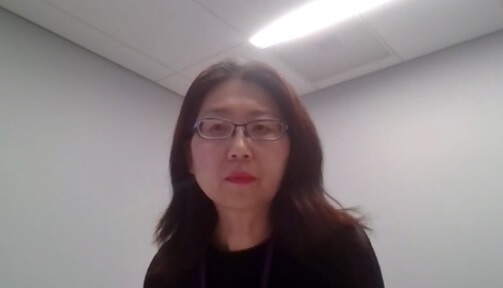New Strategies to Improve Adoptive Cell Therapies for Solid Tumors
CAR-T therapies have shown remarkable success in treating hematological malignancies. However, challenges remain in treating solid tumors. They include ineffective trafficking of the therapeutic molecule to the tumor, inefficient activation, proliferation as well as exhaustion of the therapy. At the virtual AACR conference, scientists presented different strategies that can help therapies overcome these challenges.
MUC1* Targeting CAR-T for Breast Cancers
Dr. Cynthia Bamdad from Minerva Technologies talked about CAR-T therapy for metastatic breast cancer which targets MUC1* protein, a cleavage product of the MUC1 growth factor receptor. MUC1 is aberrantly expressed on 75% of all solid tumors and is therefore considered an excellent target for anti-cancer therapies. However, previous attempts at developing any therapy have failed mainly due to the protein’s misunderstood mechanism of action.
Minerva’s MUC1* targeting huMNC2-CAR44 is a monoclonal antibody that specifically binds to cancer cells and spares normal cells. A one-time injection of the therapy in mice implanted with human breast cancer tissue successfully stopped cancer growth for as long as 100 days.
The therapy is currently tested in the first-in-human Phase 1/2 trial for breast cancer at Fred Hutch Cancer Center. So far three patients have been evaluated of which two had stable disease and one had a partial response. One patient also showed robust CAR T expansion and had 8000 CAR T cells/ml blood at Day 155.
 Dr. Cynthia Bamdad, Minerva Biotechnologies
Dr. Cynthia Bamdad, Minerva Biotechnologies
While CAR-T therapies have achieved high efficacy rates, they fail to maintain a long-term effect leading to cancer remission. This is partly due to their poor persistence in the body.
Dr. Cynthia also presented data of a modified CAR-T therapy, huMNC2-CAR-1XX that can persist longer and has a long-term negative effect on tumor growth. In a mice study, 1XX CAR was able to keep MUC1* expressing tumors in check for as long as 83 days. At this time point, standard CARs had already started differentiating and exhausting. Moreover, in tissue sections, 1XX CAR clearly showed the absence of MUC1* expressing tumor cells whereas standard CARs had a high representation of MUC1 antigen.
Allogeneic, Off-the-shelf, NK Cell Product Improves Efficacy of anti-HER2 Gastric Cancer Treatment
Immune checkpoint and adoptive cell therapies have been extremely effective at treating some cancers but have been less successful against gastric cancers. However, a new reprogrammed NK cell approach looks very promising. NK cells play an important role in cancer immunosurveillance and mediate anti-tumor and anti-viral responses. Besides the natural cytotoxicity towards transformed cells, NK cells can also secrete multiple cytokines and chemokines and modulate the immune microenvironment. Hence, NK cells hold great potential in cancer therapy.
 Dr. Lin Kang, Celularity Inc.
Dr. Lin Kang, Celularity Inc.
Dr. Lin Kang from Celularity talked about an NK cell-based product, CYNK-101 that is intended to augment and sustain antibody-dependent cellular toxicity responses (ADCC). CD16 receptor on NK cells is important for ADCC, however, affinity and durability of the ADCC response depends on the stability of CD16. CYNK-101 are NK cells that are genetically modified to express a variant of CD16 with high affinity and high stability, which promotes continuous NK cell response.
In the study, CYNK-101’s efficacy was specifically studied in combination with Trastuzumab, an antibody treatment for HER-2 positive gastric cancer. The combo treatment was highly cytotoxic which was consistent with the increased release of cytotoxic factors such as IFN-gamma, TNF-a, and GM-CSF, and was very specific to gastric cancer cell lines. The two treatments showed synergy in in vitro, ex vivo, and in vivo models. Celularity is planning to file an IND soon for a phase 1 trial to test this combo in HER2 positive gastric cancer.
Interplay Between CAR-T and Host Immune Cells Promotes a Strong anti-Tumor Response
CAR-T cells are effective at killing tumors but they don’t do this on their own. A study from Dr. Christine Brown and colleagues at Mustang Bio elucidated the role of host immunity stimulated by CAR-T treatment for a full anti-tumor response.
Their study showed that T cells extracted from glioblastoma patients post CAR-T treatment were much more tumor-reactive, produced more interferon-gamma, and had an increased ability to kill tumor cells. Furthermore, CAR-T treatment had a superior anti-tumor response in mice, which had a functional, competent immune system rather than in immunocompromised mice. This suggests that CAR-T cells may stimulate an endogenous immune response.
 Dr. Christine E. Brown, Mustang Bio
Dr. Christine E. Brown, Mustang Bio
Besides, CAR-T also generated a memory response against the tumor. When mice that were cured of cancer following CAR-T treatment were injected with tumor cells that lacked the antigen against which CAR-T was developed, they could fight the tumor cells. This suggests that CAR-T treatments could generate new T cell responses and kill tumors unknown to the immune cell before.
CAR-T cells were able to activate endogenous T cells in the tumor microenvironment as well as resident myeloid populations in glioblastoma tumors. Moreover, they induced the expression of genes associated with interferon-gamma stimulation. The role of interferon-gamma was found extremely crucial for CAR-T cell response as mice deficient for interferon-gamma failed to kill tumor cells by CAR-T therapy. A decrease in CAR-T response in IFN-negative mice was accompanied by reduced myeloid activation and host T cell activation.
This study shows that the anti-tumor response seen after CAR-T treatment cannot be attributed to the treatment alone. It is also driven by other factors such as activation of endogenous T cells and tumor resident macrophages as well as production of IFN-gamma in the vicinity of the tumor. According to Dr. Brown, “Productive CAR-T cell-mediated induction of endogenous antitumor immunity could generate polyclonal immune responses to address tumor heterogeneity and immunological memory to reduce potential tumor relapse.”
Editor: Rajaneesh K. Gopinath, Ph.D.
Related Article: Tracing Tumor Evolution and Metastasis Using a Molecular Flight Recorder
©www.geneonline.com All rights reserved. Collaborate with us: service@geneonlineasia.com









